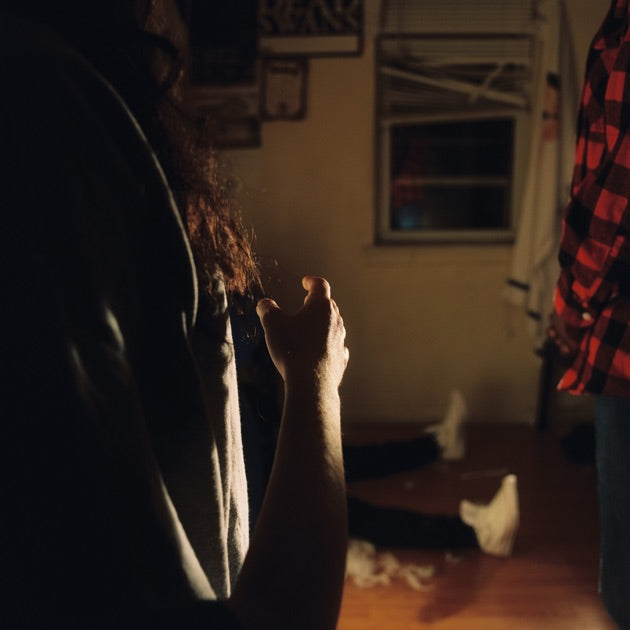
Kaonashi have always been a band unafraid to push boundaries, and on I Want to Go Home, they embrace chaos with little regard for comfort or convention. The Philadelphia-based post-hardcore/mathcore outfit continues their narrative-driven, emotionally charged songwriting, but this time the sound feels intentionally fractured—swinging unpredictably between punishing heaviness, spastic mathcore, heartfelt post-hardcore, and eerie, contemplative stillness.
The album opens with “Confusion in a Car Crash,” a deceptively calm track that quickly descends into doom-laden riffs and throbbing basslines, establishing a duality of soft melancholy giving way to blunt force that persists throughout the record. Tracks like “Slower Forms of Suicide” and “Elephant in the Room” lean into this dense, labyrinthine heaviness, their riffs recalling the complexity of Between the Buried and Me at their most intricate. Unlike BTBAM, who wield complexity with surgical precision, Kaonashi let their arrangements fray at the edges, creating jagged, unsettling grooves that evoke instability rather than mastery. The result is dark, messy, and occasionally brilliant.
Yet the band doesn’t dwell solely in aggression. On “Extra Prayers,” smooth bass and delicate percussion underpin the sound of a lonely TV clip, evoking grief and isolation. Later, “The Sanguine IV: Exit Pt. VII (The Confession of Classroom 2114)” attempts a similar vulnerability with piano and hushed vocals. While the latter can feel convoluted, both tracks demonstrate Kaonashi’s willingness to allow fragility to coexist with their more violent moments. When the band commits to these softer passages, the emotional weight lands convincingly.
Vocals remain the most polarizing element on the album. Kaonashi’s signature high-pitched fry and screamed deliveries often clash with the brooding, groove-heavy instrumentals. “Fairmount Park After Dark” exemplifies this tension, with guttural anguish giving way to shrill expressions that can verge on cartoonish. However, the moments when clean vocals emerge—on tracks like “When I Say” and “J.A.M.I.E.”—reveal a soaring post-hardcore sweetness that feels organic, recalling early 2000s emo without diluting the band’s intensity. Backing vocals often shine brighter than the leads, particularly on “Fly on the Wall,” where layered harmonies elevate riffs that might otherwise feel familiar.
Musically, I Want to Go Home thrives on unpredictability. Funky bass lines bleed into djent-inspired chugs; spastic bursts of mathcore give way to clean acoustic passages; distorted riffs twist into rap-screamed cadences. “Red Sink, Yellow Teeth” captures this spirit perfectly, moving from dark djent to groove-laden runs with unsettling fluidity. Production plays a crucial role here: despite the chaos, each instrument is clear and present, giving weight to the album’s abrupt turns and sonic experiments.
The sprawling “Sanguine” suite closes the album in four parts, encapsulating Kaonashi’s contrasting approaches. Part I combines rock-leaning riffs with soaring cleans; Part II offers a mystical guitar solo; Part III delivers dense, crushing complexity; and Part IV concludes with piano-led melancholy. The suite acts as both a summation and a microcosm of the album’s restless energy—at times brilliant, at times frustrating, leaving listeners unsure whether the band is holding everything together or intentionally letting it collapse.
At its core, I Want to Go Home thrives on contradictions: riffs that obliterate while vocals irritate, haunting atmospheres interrupted by awkward transitions, compositions that feel simultaneously meticulous and messy. Kaonashi challenge the listener, forcing us to question whether we’re hearing genius or chaos. It’s not a perfect record—vocals sometimes undermine otherwise strong ideas, and certain riffs feel recycled—but when the elements align, the album reaches rare, intense highs. Clean vocals soar, bass cuts deep, and riffs bend genres until they fracture. At its best, this record feels like the soundtrack to a nervous breakdown: ugly, beautiful, absurd, and undeniably human.
Ultimately, I Want to Go Home is a chaotic, frustrating, yet uniquely compelling album. By blending spastic mathcore, doom-heavy riffs, and earnest post-hardcore melodies, Kaonashi create an experience that won’t leave listeners indifferent—you’ll either be captivated or desperate for silence.
Rating: 7/10
NOTABLE TRACKS:
Extra Prayers
When I Say
J.A.M.I.E

